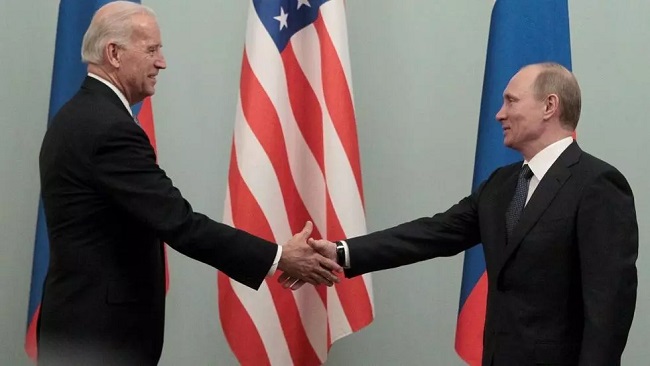Russia, China hold off on congratulating Biden for US election win
Russian President Vladimir Putin has remained silent on the issue since Democrat Joe Biden clinched the presidency on Saturday, four days after the Nov. 3 election, clearing the threshold of 270 Electoral College votes needed to win the White House.
In the vote’s run-up, Putin had appeared to hedge his bets, frowning on Biden’s anti-Russian rhetoric but welcoming his comments on nuclear arms control. Putin had also defended Biden’s son, Hunter, against criticism from Trump.
Speaking to reporters on a conference call, Kremlin spokesman Dmitry Peskov said on Monday that Moscow deemed it better to now wait before congratulating anyone.
“We think it appropriate to wait for the official vote count,” said Peskov.
Asked why in 2016 Putin had congratulated Trump soon after he had won the Electoral College and beaten Democrat Hillary Clinton, Peskov said there was an obvious difference this time round.
“You can see that there are certain legal procedures that have been announced by the current president. That is why the situations are different and we therefore think it appropriate to wait for an official announcement,” said Peskov.
He noted that Putin had repeatedly said he was ready to work with any US leader and that Russia hoped it could establish dialogue with a new US administration and find a way to normalise troubled bilateral relations.
Moscow’s ties with Washington sank to post-Cold War lows in 2014 when Russia annexed Crimea from Ukraine. Biden was serving as vice president under President Barack Obama at the time.
Relations soured further over US allegations that Moscow had meddled in the 2016 US presidential election to try to tilt the vote in Trump’s favour, something the Kremlin denied.
‘Avoid getting entangled’ in election dispute
China has also held off on congratulating Biden, saying it will follow custom in responding to the result.
“We noticed that Mr. Biden has declared election victory,” foreign ministry spokesman Wang Wenbin told a daily media briefing. “We understand that the US presidential election result will be determined following US law and procedures.”
In 2016, Chinese President Xi Jinping sent congratulations to Trump on Nov. 9, a day after the election.
Relations between China and the United States are at their worst in decades over disputes ranging from technology and trade to Hong Kong and the coronavirus, and the Trump administration has unleashed a barrage of sanctions against Beijing.
While Biden is expected to maintain a tough stance on China — he has called Xi a “thug” and vowed to lead a campaign to “pressure, isolate and punish China” — he is likely to take a more measured and multilateral approach.
“We always believe that China and the United States should enhance communication and dialogue, manage differences on the basis of mutual respect, expand cooperation on the basis of mutual benefit and promote sound and stable development of bilateral relations,” Wang told the briefing.
Hu Xijin, editor of the Global Times, a tabloid published by the ruling Communist Party’s People’s Daily, said in a tweet: “China hasn’t congratulated Biden on his victory as quickly as Western countries did.”
“I think it’s because China needs to keep larger distance from the US presidential election to avoid getting entangled in its controversy. This actually shows that China respects the US as a whole,” he added.
Earlier on Monday, Chinese state media struck an optimistic tone in editorials, saying relations could be restored to a state of greater predictability, starting with trade.
While acknowledging that Washington was unlikely to ease pressure on China over issues such as Xinjiang and Hong Kong, the Global Times said Beijing should work to communicate with Biden’s team.
“It’s in the common interests of people from both countries and of the international community that China-US relations become eased and controllable,” it said.
The China Daily said it was “obvious” improving ties with China could start from trade, and reviving trade talks was critical to restoring some understanding and trust.
(FRANCE 24 with REUTERS)





